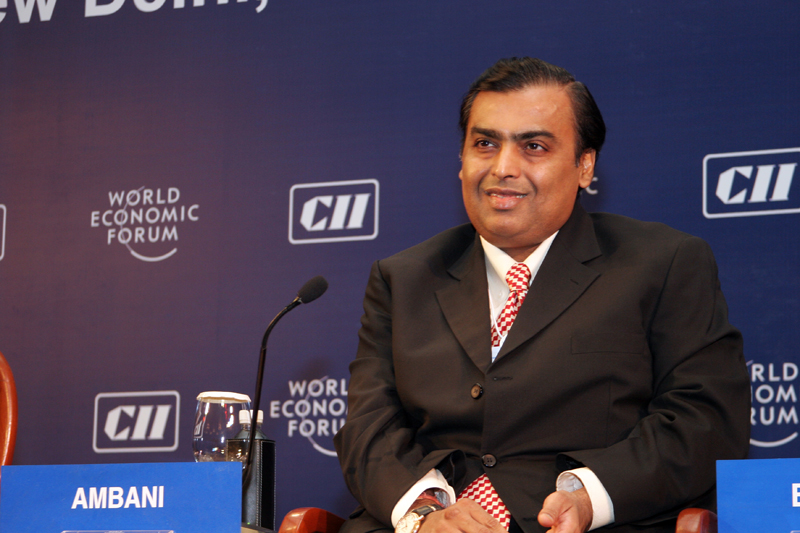
By Jason Arendt
Asia’s richest man, Mukesh Ambani, unveiled his plan to create an Indian e-commerce giant on October 25, 2019.[1] In a speech to shareholders, Ambani announced that the Reliance Industries Limited board of directors had approved a $24 billion capital allocation to a digital service holding company.[2] This move comes after a series of small acquisitions of business-to-business and business-to-customer logistics companies made by Reliance Industries Limited in early 2019.[3]
Reliance Retail, a major subsidiary of Reliance Industries Limited, is the largest retailer in India with over 10,000 stores providing groceries, home goods, clothing, and electronics, among others.[4] Ambani projects that in the coming years, Reliance Retail will account for over 50% of Reliance Industries Limited’s revenue share.[5] The Indian e-commerce sector is dominated by Amazon and Flipkart, Walmart’s Indian e-commerce service, which together make up 85% of the online retail market share in India.[6] By integrating the core competencies of the previously acquired logistics companies with the unparalleled access to capital, Ambani hopes to enter, disrupt, and dominate the Indian e-commerce sector.[7]
Regulators are taking note of Ambani’s multi-billion-dollar gamble in pursuit of fair competition between the major market players.[8] In 2002, the Indian Parliament updated their antitrust enforcement practices through the Competition Act, which fully came into effect in 2011.[9] Although the Competition Act modernized India’s approach to antitrust enforcement, concentration of market power still remains a prevalent issue in the world’s second fastest growing economy.[10]
The Competition Act forbids appreciable adverse effects on competition (AAECs) that arise from horizontal agreements, vertical agreements, or abuses of a dominant market position.[11] Horizontal agreements between competitors have the presumption of creating an AAEC that must be rebutted to quash an antitrust suit;[12] conversely, vertical agreements between different levels of the value chain must be shown to have an AAEC for an antitrust suit to proceed.[13] Additionally, regulators may show that a business is abusing its dominant market position to proceed with an antitrust suit.[14]
Reliance’s entry into the e-commerce sector invites antitrust scrutiny to the already dominant retailer. Regulators will likely take aim at Reliance’s proposed entry into the e-commerce sector by alleging abuse of a dominant position and an abusive vertical agreement. To sustain an antitrust action against Reliance, regulators need to demonstrate that Reliance dominates the brick-and-mortar retail sector through market share and relative power, operates independently of competitive forces in that sector, and uses its dominant position to enter another market.[15] Reliance will aim to show that the e-commerce sector is an extension of the retail sales sector, precluding an antitrust action based on abuse of a dominant market position.
Regulators will also pursue antitrust action surrounding Reliance’s vertical agreements. Following the acquisitions made earlier this year, Reliance Industries Limited has isolated their value chain from the influence of outside market players.[16] Product development, business-to-business logistics, home delivery services, and in-store pickup may soon be fully integrated into Reliance’s new e-commerce platform.[17] To show that this vertical integration will have an AAEC, regulators should draw comparisons between Reliance’s treatment of in-house brands and the preferential treatment Amazon gives to AmazonBasics products. Earlier this year, Indian Prime Minister Narenda Modi enacted a new policy that prohibits e-commerce retailers from selling their own products on their e-commerce platform.[18] The Prime Minister’s new policy was widely seen as a protectionist move to shelter Indian retailers from Amazon and Walmart’s stranglehold on e-commerce retailing.[19] It remains to be seen whether Prime Minster Modi will reform or upend this policy in light of Ambani’s announcement.
Ultimately, the Indian Parliament should focus on further
modernizing their approach to antitrust action. Proposed amendments in 2012
would have introduced a joint dominance consideration for assessing dominance
of two or more market players, such as the impending e-commerce oligopoly.[20] Regulators
must remain flexible in the face of changing market and political conditions to
ensure fair competition in the e-commerce sector.
[1] Chairman and Managing Director, Reliance Industries Limited, https://www.ril.com/OurCompany/Leadership/Mukesh-Ambani-Chairman-and-Managing-Director.aspx (last visited Nov. 4, 2019).
[2] See Mukesh Ambani gears up for India’s e-commerce giant with $24 billion holding firm, The Economic Times, (Oct. 28, 2019), https://telecom.economictimes.indiatimes.com/news/mukesh-ambani-gears-up-for-indias-e-commerce-giant-with-24-billion-holding-firm/71790990.
[3] See Nachiket Kelkar, Mukesh Ambani’s hybrid model may disrupt e-commerce, The Week (June 22, 2019, 12:16 PM), https://www.theweek.in/theweek/business/2019/06/21/mukesh-ambani-hybrid-model-may-disrupt-e-commerce.html.
[4] Our Business, Reliance Retail, https://relianceretail.com/our-business.html (last visited Nov. 4, 2019).
[5] Indian billionaire Ambani aims to emulate Alibaba with new digital entity, Nikkei Asian Review (Oct. 29, 2019, 10:05 PM), https://asia.nikkei.com/Business/Companies/Indian-billionaire-Ambani-aims-to-emulate-Alibaba-with-new-digital-entity.
[6] Mihir Dahl, Internet Monopolies: India’s Trust Deficit, LiveMint (July 10, 2019, 11:41 PM). https://www.livemint.com/technology/tech-news/internet-monopolies-india-s-trust-deficit-1562781421036.html.
[7] See Nikkei Asian Review, supra note 5.
[8] Dahl, supra note 6.
[9] Samir Gandhi, et al, Antitrust and Competition in India, Baker McKenzie https://globalcompliancenews.com/antitrust-and-competition/antitrust-and-competition-in-india/ (last visited Nov. 3, 2019).
[10] Id.; Dahl, supra note 6; India Loses Place as World’s Fastest-Growing Economy, BBC News (May 31, 2019) https://www.bbc.com/news/business-48478028.
[11] Gandhi, supra note 8.
[12] Id.
[13] Id.
[14] Id. (listing discriminatory pricing, restriction of goods or services, prejudicial development of goods, denial of market access, predatory contractual obligations, and leveraging a dominant position in one market to enter and control another as prohibited practices).
[15] See id.
[16] See id.
[17] See Reliance Retail, supra note 4.
[18] Panos Mourdoukoutas, Modi Won’t Let Amazon Crush India’s Retailers, For Now, Forbes (Feb. 9, 2019), https://www.forbes.com/sites/panosmourdoukoutas/2019/02/09/modi-wont-let-amazon-crush-indias-retailers-for-now/#3c.
[19] Id.
[20]Gandhi, supra note 8.

